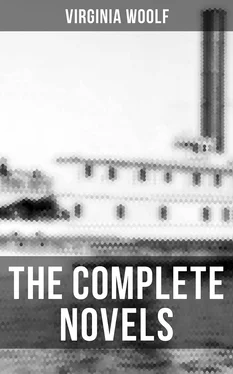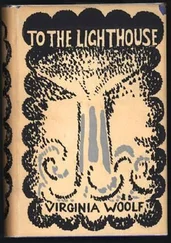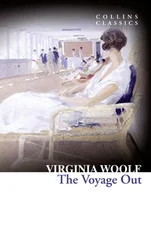Two roads led out of the town on the eastern side; one branched off towards the Ambroses’ villa, the other struck into the country, eventually reaching a village on the plain, but many footpaths, which had been stamped in the earth when it was wet, led off from it, across great dry fields, to scattered farm-houses, and the villas of rich natives. Hewet stepped off the road on to one of these, in order to avoid the hardness and heat of the main road, the dust of which was always being raised in small clouds by carts and ramshackle flies which carried parties of festive peasants, or turkeys swelling unevenly like a bundle of air balls beneath a net, or the brass bedstead and black wooden boxes of some newly wedded pair.
The exercise indeed served to clear away the superficial irritations of the morning, but he remained miserable. It seemed proved beyond a doubt that Rachel was indifferent to him, for she had scarcely looked at him, and she had talked to Mr. Flushing with just the same interest with which she talked to him. Finally, Hirst’s odious words flicked his mind like a whip, and he remembered that he had left her talking to Hirst. She was at this moment talking to him, and it might be true, as he said, that she was in love with him. He went over all the evidence for this supposition—her sudden interest in Hirst’s writing, her way of quoting his opinions respectfully, or with only half a laugh; her very nickname for him, “the great Man,” might have some serious meaning in it. Supposing that there were an understanding between them, what would it mean to him?
“Damn it all!” he demanded, “am I in love with her?” To that he could only return himself one answer. He certainly was in love with her, if he knew what love meant. Ever since he had first seen her he had been interested and attracted, more and more interested and attracted, until he was scarcely able to think of anything except Rachel. But just as he was sliding into one of the long feasts of meditation about them both, he checked himself by asking whether he wanted to marry her? That was the real problem, for these miseries and agonies could not be endured, and it was necessary that he should make up his mind. He instantly decided that he did not want to marry any one. Partly because he was irritated by Rachel the idea of marriage irritated him. It immediately suggested the picture of two people sitting alone over the fire; the man was reading, the woman sewing. There was a second picture. He saw a man jump up, say good-night, leave the company and hasten away with the quiet secret look of one who is stealing to certain happiness. Both these pictures were very unpleasant, and even more so was a third picture, of husband and wife and friend; and the married people glancing at each other as though they were content to let something pass unquestioned, being themselves possessed of the deeper truth. Other pictures—he was walking very fast in his irritation, and they came before him without any conscious effort, like pictures on a sheet—succeeded these. Here were the worn husband and wife sitting with their children round them, very patient, tolerant, and wise. But that too, was an unpleasant picture. He tried all sorts of pictures, taking them from the lives of friends of his, for he knew many different married couples; but he saw them always, walled up in a warm firelit room. When, on the other hand, he began to think of unmarried people, he saw them active in an unlimited world; above all, standing on the same ground as the rest, without shelter or advantage. All the most individual and humane of his friends were bachelors and spinsters; indeed he was surprised to find that the women he most admired and knew best were unmarried women. Marriage seemed to be worse for them than it was for men. Leaving these general pictures he considered the people whom he had been observing lately at the hotel. He had often revolved these questions in his mind, as he watched Susan and Arthur, or Mr. and Mrs. Thornbury, or Mr. and Mrs. Elliot. He had observed how the shy happiness and surprise of the engaged couple had gradually been replaced by a comfortable, tolerant state of mind, as if they had already done with the adventure of intimacy and were taking up their parts. Susan used to pursue Arthur about with a sweater, because he had one day let slip that a brother of his had died of pneumonia. The sight amused him, but was not pleasant if you substituted Terence and Rachel for Arthur and Susan; and Arthur was far less eager to get you in a corner and talk about flying and the mechanics of aeroplanes. They would settle down. He then looked at the couples who had been married for several years. It was true that Mrs. Thornbury had a husband, and that for the most part she was wonderfully successful in bringing him into the conversation, but one could not imagine what they said to each other when they were alone. There was the same difficulty with regard to the Elliots, except that they probably bickered openly in private. They sometimes bickered in public, though these disagreements were painfully covered over by little insincerities on the part of the wife, who was afraid of public opinion, because she was much stupider than her husband, and had to make efforts to keep hold of him. There could be no doubt, he decided, that it would have been far better for the world if these couples had separated. Even the Ambroses, whom he admired and respected profoundly—in spite of all the love between them, was not their marriage too a compromise? She gave way to him; she spoilt him; she arranged things for him; she who was all truth to others was not true to her husband, was not true to her friends if they came in conflict with her husband. It was a strange and piteous flaw in her nature. Perhaps Rachel had been right, then, when she said that night in the garden, “We bring out what’s worst in each other—we should live separate.”
No Rachel had been utterly wrong! Every argument seemed to be against undertaking the burden of marriage until he came to Rachel’s argument, which was manifestly absurd. From having been the pursued, he turned and became the pursuer. Allowing the case against marriage to lapse, he began to consider the peculiarities of character which had led to her saying that. Had she meant it? Surely one ought to know the character of the person with whom one might spend all one’s life; being a novelist, let him try to discover what sort of person she was. When he was with her he could not analyse her qualities, because he seemed to know them instinctively, but when he was away from her it sometimes seemed to him that he did not know her at all. She was young, but she was also old; she had little self-confidence, and yet she was a good judge of people. She was happy; but what made her happy? If they were alone and the excitement had worn off, and they had to deal with the ordinary facts of the day, what would happen? Casting his eye upon his own character, two things appeared to him: that he was very unpunctual, and that he disliked answering notes. As far as he knew Rachel was inclined to be punctual, but he could not remember that he had ever seen her with a pen in her hand. Let him next imagine a dinner-party, say at the Crooms, and Wilson, who had taken her down, talking about the state of the Liberal party. She would say—of course she was absolutely ignorant of politics. Nevertheless she was intelligent certainly, and honest too. Her temper was uncertain—that he had noticed—and she was not domestic, and she was not easy, and she was not quiet, or beautiful, except in some dresses in some lights. But the great gift she had was that she understood what was said to her; there had never been any one like her for talking to. You could say anything—you could say everything, and yet she was never servile. Here he pulled himself up, for it seemed to him suddenly that he knew less about her than about any one. All these thoughts had occurred to him many times already; often had he tried to argue and reason; and again he had reached the old state of doubt. He did not know her, and he did not know what she felt, or whether they could live together, or whether he wanted to marry her, and yet he was in love with her.
Читать дальше












